Pablomago
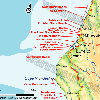
Joined: Mar 23, 2017
Posts: 85
Fort Collins, CO/Moonstone Beach, CA

|

Posted on Apr 16 2018 03:11 PM
Around 1963, American amps started sporting reverb. Fender, Gibson, Supro, Ampeg...
But British amps of the same era continued to be sans-verb. Marshall, Vox (UK models anyway), Hiwatt etc. Why didn't they add reverb? An inability to procure reverb tanks? Musicians in the UK didn't care? Does anyone know the answer?
— All opinions expressed by this poster are well thought out and based on actual experience and/or scientific experimentation, except for those which are knee-jerk reactions or good sounding fantasies.
Last edited: Apr 16, 2018 16:19:00
|
MelWaldorf
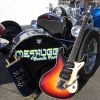
Joined: Mar 03, 2006
Posts: 646

|

Posted on Apr 16 2018 04:32 PM
FWIW, JMI Vox started offering reverb on AC30s in 1964, but Tom Jennings didn't want to pay the Hammond license so he made his own, far less effective reverb using phono cartridges.
|
djangodeadman

Joined: Jan 25, 2007
Posts: 1564
Brighton UK




|

Posted on Apr 16 2018 04:47 PM
Just a hunch, but British bands liked tape delay, so not so much demand for reverb. JIM, of course, made tape delays.
— Los Fantasticos
|
Tqi

Joined: Dec 07, 2014
Posts: 1222

|

Posted on Apr 16 2018 06:57 PM
-
Last edited: Feb 02, 2024 13:37:46
|
crumble

Joined: Sep 09, 2008
Posts: 3158
Guildford England





|

Posted on Apr 17 2018 06:42 AM
Things were still a little tight here in the early 1960's Great Britain, most people bought luxuries by hire purchase. I'd guess it was more affordable to offer sound effects separately. Coming up to 1965 the harder grittier sound of the Who, Small faces we were moving away from the overbearing early rock & roll sound effects.
Here's the Selmer Truvoice Echo Chamber demonstration 1961 (reverb demo on part 2).
|
djangodeadman

Joined: Jan 25, 2007
Posts: 1564
Brighton UK




|

Posted on Apr 17 2018 07:24 AM
I'm not convinced that mist British gigs in the 1960's took place in Tudor public houses and Edwardian village halls, quaint as that sounds.
— Los Fantasticos
|
Brian

Joined: Feb 25, 2006
Posts: 19192
Des Moines, Iowa, USA










|

Posted on Apr 17 2018 08:19 AM
Or American bands playing in drive-in movie theaters.
— Site dude - S3 Agent #202
Need help with the site? SG101 FAQ - Send me a private message - Email me
"It starts... when it begins" -- Ralf Kilauea
|
crumble

Joined: Sep 09, 2008
Posts: 3158
Guildford England





|

Posted on Apr 17 2018 08:46 AM
djangodeadman wrote:
I'm not convinced that mist British gigs in the 1960's took place in Tudor public houses and Edwardian village halls, quaint as that sounds.
As well as pubs bands also played in cinemas and theaters. A lot of these buildings were acoustically shaped, smaller at the stage and wider/taller at the back from days before P.A. systems. Probably the same the world over.
Last edited: Apr 17, 2018 12:06:36
|
Clarry
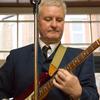
Joined: Oct 01, 2014
Posts: 519
Streatham, London



|

Posted on Apr 17 2018 12:16 PM
I think he was joking!
Look at where early beat groups not on the Theatre circuit played and it was dance halls, cellars, etc. It would have been rare in the 60s to perform in a pub unless it had a hall. You'd rarely see jukeboxes too.
I get really annoyed when I see modern TV shows with pubs in the era with jukeboxes and everyone with cat radios. Not in the UK. We couldn't afford a car radio until the late 70s.
|
Tqi

Joined: Dec 07, 2014
Posts: 1222

|

Posted on Apr 17 2018 12:26 PM
-
Last edited: Feb 02, 2024 13:39:16
|
Tqi

Joined: Dec 07, 2014
Posts: 1222

|

Posted on Apr 17 2018 12:40 PM
-
Last edited: Feb 02, 2024 13:39:08
|
crumble

Joined: Sep 09, 2008
Posts: 3158
Guildford England





|

Posted on Apr 17 2018 01:09 PM
Clarry wrote:
Not in the UK. We couldn't afford a car radio until the late 70s.
I feel a "Four Yorkshiremen" Python Sketch coming on... 
|
synchro
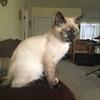
Joined: Feb 02, 2008
Posts: 4124
Not One-Sawn, but Two-Sawn . . . AZ.





|

Posted on Apr 17 2018 11:12 PM
My first thought regarding this was that the Hammond licensing probably had something to do with it. Hank Marvin was using tape delay quite creatively at the time and obtaining a sound that was similar, though not actually reverb. It may well be that the influence of the Shadows played a role in this. As I’ve commented before, the Shadows were not well known in the US, but it seems that every young guitar-slinger in the British Empire was listening to Hank . . . and I suspect they were a lot more interested in Meazzi tape delays and Binson magnetic drum delay units than spring reverbs.
It didn’t take long, as mentioned above, Vox wasn’t too far behind Fender, but it was never exactly the same. Just look at the directions taken by Fender, Marshall and Vox. I dunno, maybe it’s all related to which side of the car the steering wheel was on. 
Of course, here in the states, we were all locked up in reform school for digging under the fence at the drive-theater, so we could see the reverb-using American bands with their Fender amps. 
— The artist formerly known as: Synchro
When Surf Guitar is outlawed only outlaws will play Surf Guitar.
|
Tqi

Joined: Dec 07, 2014
Posts: 1222

|

Posted on Apr 18 2018 07:05 PM
-
Last edited: Feb 02, 2024 13:45:44
|
crumble

Joined: Sep 09, 2008
Posts: 3158
Guildford England





|

Posted on Apr 19 2018 04:47 AM
Tqi wrote:
So Vox were the only company in the 'British Sound' when the Fender Reverb unit was hitting the mainstream in '61.
No doubt Vox was a popular choice. There were other manufactures. Here's my very first amplifier which I bought in about 1972 for £50 - The Watkins Joker, If only I could go back in time and stop myself selling it! 1961/62 Only 400 ever made.
Info Here
|
Donald77
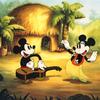
Joined: Jun 23, 2012
Posts: 226



|

Posted on Apr 23 2018 04:31 PM
|
synchro

Joined: Feb 02, 2008
Posts: 4124
Not One-Sawn, but Two-Sawn . . . AZ.





|

Posted on Apr 23 2018 04:47 PM
Donald77 wrote:
They didn't use reverb because otherwise the Shadows wouldn't have echo 
I played a gig Saturday, about 50% Surf, and used the Shadows presets on my Blue Nebula for several Surf tunes. No reverb, just some very cool echo. It was killer.
— The artist formerly known as: Synchro
When Surf Guitar is outlawed only outlaws will play Surf Guitar.
|
da-ron
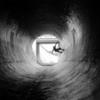
Joined: Jan 02, 2009
Posts: 1298
The original Plymouth, UK.






|

Posted on Apr 24 2018 03:57 AM
djangodeadman wrote:
I'm not convinced that mist British gigs in the 1960's took place in Tudor public houses and Edwardian village halls, quaint as that sounds.
Well, here's the inside of Tavistock town hall where most bands played in the 60's. It still looks like this. The stairs are lined with photos of 60's beat groups playing there to girls about to pass out.

I think you're right that there wasn't much cash around, no one wanted or could afford to pay the Hammond licence. Possibly the main guitar band around were the Shadows who used tape echo - reverb was a studio effect back then. American amps with reverb would have been very rare here in the early 60s, I think.
Good question though. Difficult to answer with 21st century knowledge. It's hard to appreciate how little information and equipment there was around in those days, when there is abundance of it now.
— http://thewaterboarders.bandcamp.com/
|
Big_Swell_Drifter

Joined: Apr 09, 2018
Posts: 33
Sydney

|

Posted on Apr 24 2018 08:40 PM
da-ron
You wouldn't have needed reverb playing in a room with ceilings that high.
It is a good question though. I agree - reverb was largely a studio effect back then - plates, chambers and larger spring units
For anyone that's interested, Dave Hunter has just published a book The British Amp Invasion. I bought it for myself for Christmas and have just started reading it. Will post to this thread if he addresses the Brit amp non-reverb issue.
— https://www.facebook.com/thebigswelldrifters/
https://thebigswelldrifters.bandcamp.com
https://soundcloud.com/thebigswelldrifters
https://www.reverbnation.com/thebigswelldrifters1
|
Clarry

Joined: Oct 01, 2014
Posts: 519
Streatham, London



|

Posted on Apr 25 2018 05:11 AM
da-ron wrote:
djangodeadman wrote:
I'm not convinced that mist British gigs in the 1960's took place in Tudor public houses and Edwardian village halls, quaint as that sounds.
Well, here's the inside of Tavistock town hall where most bands played in the 60's. It still looks like this. The stairs are lined with photos of 60's beat groups playing there to girls about to pass out.

It's a long way for the girls to throw their knickers up to the minstrel's gallery.
|







































